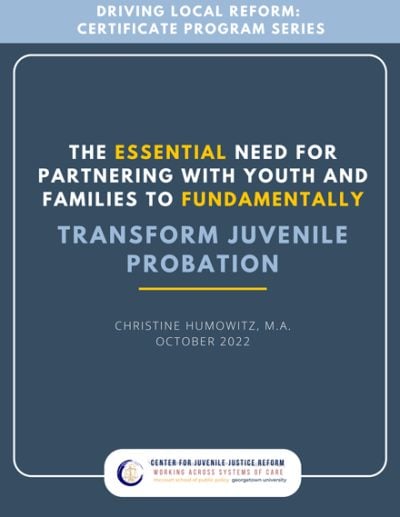Summary
Probation is the most common disposition in the juvenile justice system. Yet, jurisdictions across the United States have not fully aligned their probation policies and practices with a developmental approach—one that recognizes the science on youth development and embraces a more holistic, collaborative, therapeutic and community-centered philosophy to serving youth and families.
This publication focuses on one of the values and strategies at the core of the Transforming Juvenile Probation approach—that is, the essential need for partnering with and empowering youth and families in probation policy and practice. It reviews research literature on youth and family partnerships and discusses challenges and strategies related to this most important endeavor.
The document is the first installment in a three-part series that shares themes from the national movement to fundamentally transform juvenile probation practices. Its content also aligns with a certificate program supported by the Annie E. Casey Program and launched by Georgetown University’s McCourt School of Public Policy.
Benefits of Youth and Family Partnerships
Engaging youth and families in juvenile justice probation practices has proven benefits for youth, families and communities.
When probation officers and leaders meaningfully connect with young people, the youth involved have an opportunity to share important information about their lives and the types of supports they need to succeed. Approaches centered on youth and family are associated with a number of positive outcomes, including: higher levels of academic engagement, increased numbers of positive relationships and decreased likelihood of recidivism. In addition, strong family involvement can help promote youth safety, permanency and well-being while shielding a young person from harmful external influences.
Strategies to Establish Strong Youth and Family Partnerships
Juvenile probation staff and partners have ample opportunities to develop and sustain strong partnerships with youth and families. Strategies that system leaders and practitioners can use to authentically engage young people and their support systems include: broadening the definition of family, using accessible language, incorporating family strengths into case plans, providing individualized support to families and elevating the voices of youth and families in new agency policies.







